
Member of the Colorado Bar Association since 2014. Attorney, Christopher M. Nicolaysen focuses primarily on helping those injured in Colorado car accidents, other auto accidents, and Colorado personal injury incidents.
This article has been written and reviewed for legal accuracy and clarity by the team of writers and attorneys at Springs Law Group and is as accurate as possible. This content should not be taken as legal advice from an attorney. If you would like to learn more about our owner and experienced Colorado personal injury lawyer, Christopher Nicolaysen, you can do so here.
Springs Law Group does everything possible to make sure the information in this article is up to date and accurate. If you need specific legal advice about your case, contact us. This article should not be taken as advice from an attorney.
On this page, we’ll discuss the AFFF Lawsuit, the dangers of exposure to AFFF (aqueous film forming foam), the current AFFF Lawsuits filed against the manufacturers of PFAS chemicals in federal court, and how our AFFF Lawyers can help you.
For decades, aqueous film forming foam (AFFF) has been used by the military and in several other industries to combat highly flammable liquid fires started by jet fuel, gasoline, and other substances.
While a vital tool in these situations, AFFF foam contains toxic chemicals – per- and polyfluoroalkyl substances (PFAS).
PFAS chemicals are toxic to humans and the environment, linked to severe medical conditions like cancer, thyroid disease, and other health risks.
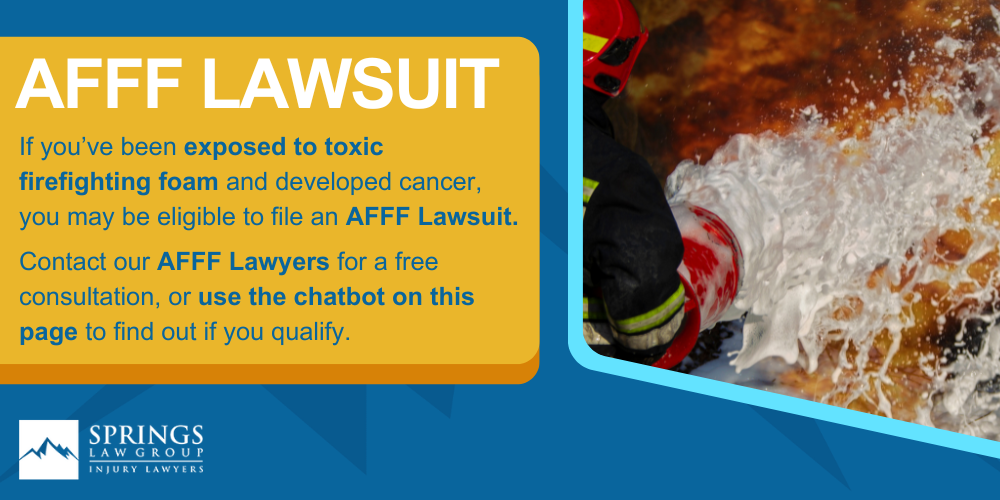
To manage the number of lawsuits filed over AFFF exposure and subsequent health complications, the AFFF Firefighting Foam MDL was established by the Judicial Panel on Multidistrict Litigation (JPML).
The AFFF MDL centralizes thousands of AFFF Lawsuits filed by military service members, military firefighters, municipal firefighters, and others for direct exposure to AFFF, as well as certain municipalities whose water has been contaminated by PFAS firefighting foam.
Our AFFF Firefighting Foam Lawyers are currently accepting new clients for the AFFF Litigation.
If you have been exposed to AFFF during your military service or at work and subsequently developed cancer or other serious conditions related to PFAS exposure, you may be eligible to file an AFFF Lawsuit and seek financial compensation.
Reach out to Springs Law Group today for a free consultation to find out if you’re eligible to file an AFFF Lawsuit.
Use the chatbot on this page for a free and confidential case evaluation to find out instantly if you qualify to join others filing AFFF Firefighting Foam cases.
Exposure to AFFF firefighting foam introduces toxic PFAS chemicals, often called “forever chemicals,” into the body, where they accumulate over time due to their resistance to breaking down.
Prolonged exposure to AFFF, especially through direct contact, leads to the bioaccumulation of these dangerous chemicals in the bloodstream and organs, significantly increasing the risk of developing severe health conditions.
PFAS chemicals are absorbed through the skin, inhaled during fire suppression activities, and even ingested if the chemicals contaminate water sources, gradually impacting the body’s internal systems.
Studies have shown that exposure to PFAS is linked to several forms of cancer, including kidney cancer, testicular cancer, and thyroid cancer, as well as other conditions like liver damage and immune system suppression.
The health effects of AFFF exposure are devastating, as the chemicals interfere with normal cellular processes, disrupt hormone regulation, and increase the likelihood of tumor development.
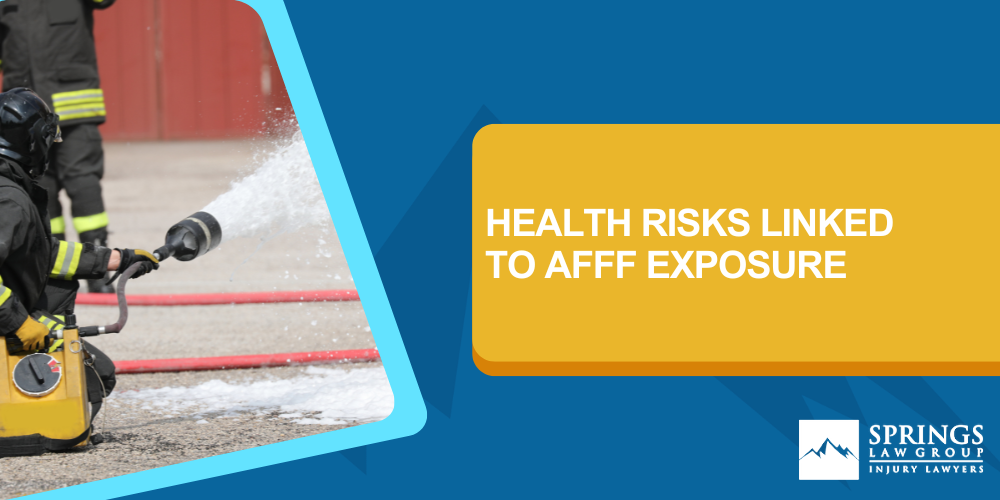
Over time, individuals who have worked closely with AFFF, such as firefighters and military personnel, are at heightened risk of these life-altering diseases.
The persistent nature of PFAS in the body and environment compounds these risks, meaning the damage may continue long after exposure has ceased.
Prolonged exposure to AFFF firefighting foam has been conclusively linked to several types of cancer due to the presence of PFAS chemicals.
PFAS have been identified by trusted sources like the Environmental Protection Agency (EPA) and the Centers for Disease Control and Prevention (CDC) as carcinogens with the potential to cause severe health problems.
According to the National Cancer Institute, PFAS accumulate in the body over time, increasing the risk of developing cancers, especially in individuals who were regularly exposed through their occupations, such as firefighters and military personnel.
Research from the International Agency for Research on Cancer (IARC) has classified PFOA, a key compound in AFFF, as possibly carcinogenic to humans, particularly linked to several forms of cancer.
Cancers potentially linked to AFFF exposure include:
While cancer is a primary concern, AFFF exposure can also lead to a variety of other serious health conditions that severely affect an individual’s quality of life.
PFAS chemicals accumulate in the body and interfere with critical bodily functions, including hormone regulation and immune response.
Studies from the Harvard University and the Agency for Toxic Substances and Disease Registry (ATSDR) have linked PFAS exposure to a range of non-cancerous health issues, which can develop after long-term contact with the chemicals.
These health risks are particularly concerning for those who worked in high-exposure environments, such as firefighters and industrial workers, where AFFF was used frequently.
The persistent nature of PFAS in the bloodstream and organs causes long-lasting damage, resulting in chronic conditions that may affect overall well-being and life expectancy.
Other human health risks linked to AFFF exposure include:
The AFFF Lawsuit refers to the legal actions being taken against manufacturers of Aqueous Film-Forming Foam (AFFF) and toxic PFAS chemicals.
Plaintiffs, many of whom are firefighters, military personnel, and industrial workers, allege that AFFF manufacturers knew of the dangers posed by PFAS, yet failed to warn users.
AFFF Firefighting Foam Lawsuits have been consolidated into a multidistrict litigation (MDL), specifically MDL 2873, in the U.S. District Court for the District of South Carolina.
The MDL streamlines the process for handling thousands of similar cases, allowing for efficient pre-trial proceedings and consistent rulings across all consolidated AFFF personal injury lawsuits.
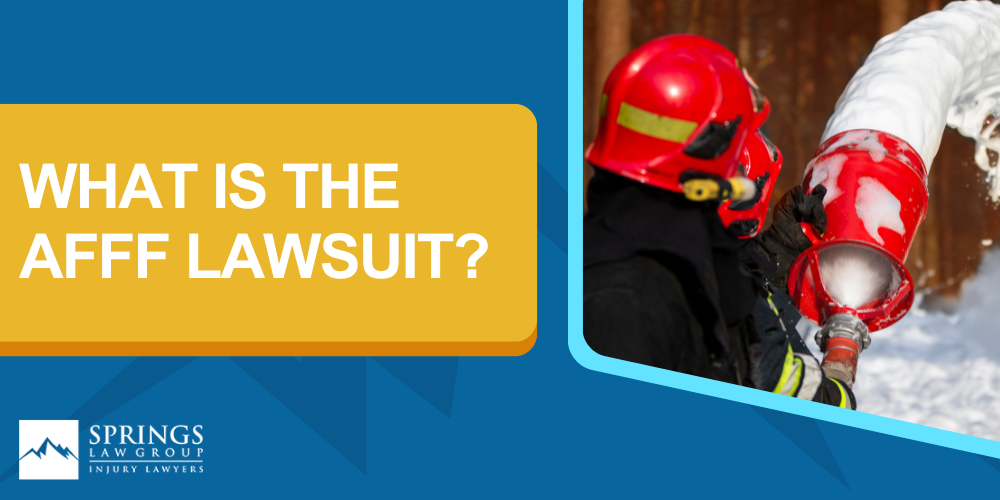
Although no personal injury settlements have been finalized yet, prior PFAS contamination lawsuits, such as those involving water systems, have already led to major settlements, raising expectations for future compensation.
AFFF Lawsuits seek damages to cover medical expenses, lost wages, and other related costs for individuals harmed by exposure.
Many of the claims focus on holding manufacturers accountable for their negligence in distributing AFFF without proper safety warnings.
No, there is not an AFFF Class Action Lawsuit for personal injury claims related to exposure to AFFF.
These cases, as mentioned above, are consolidated into AFFF MDL.
Some marketers and law firms refer to the ongoing AFFF MDL as the “AFFF Class Action Lawsuit” or the “AFFF Class Action MDL”.
This can be confusing, but know that the pending AFFF Lawsuits in the United States District Court for the District of South Carolina are not a class action lawsuit.
MDL is different from class action cases in that each plaintiff’s claim remains separate, allowing for individual consideration of their unique circumstances, injuries, and damages.
While class actions typically treat all plaintiffs as a single group with uniform compensation, MDL ensures that compensation is based on the specific facts of each case.
This process allows for more personalized legal outcomes, tailored to the severity of each individual’s exposure and health issues.
Those affected by AFFF exposure can still file lawsuits and have their claims heard under the MDL structure, without being grouped into a singular settlement.
AFFF personal injury cases are being filed by thousands of people who have suffered from direct occupational exposure to AFFF firefighting foam.
Individuals who worked as firefighters, military personnel, airport workers, or in industrial settings where AFFF was regularly used are among those most likely to qualify.
To be eligible, plaintiffs typically need to demonstrate a link between their PFAS exposure and subsequent health conditions, such as kidney cancer, testicular cancer, or other serious illnesses.
Workers who were involved in firefighting, training exercises, or even the handling and disposal of AFFF products may also be eligible to file a lawsuit.
Individuals diagnosed with health issues after long-term exposure to AFFF are encouraged to consult with AFFF firefighting foam lawyers to assess their potential claims.
The AFFF MDL also contains municipal water contamination cases from communities across the United States nearby military bases and other areas where AFFF was frequently used.
Springs Law Group is accepting new clients for AFFF personal injury claims.
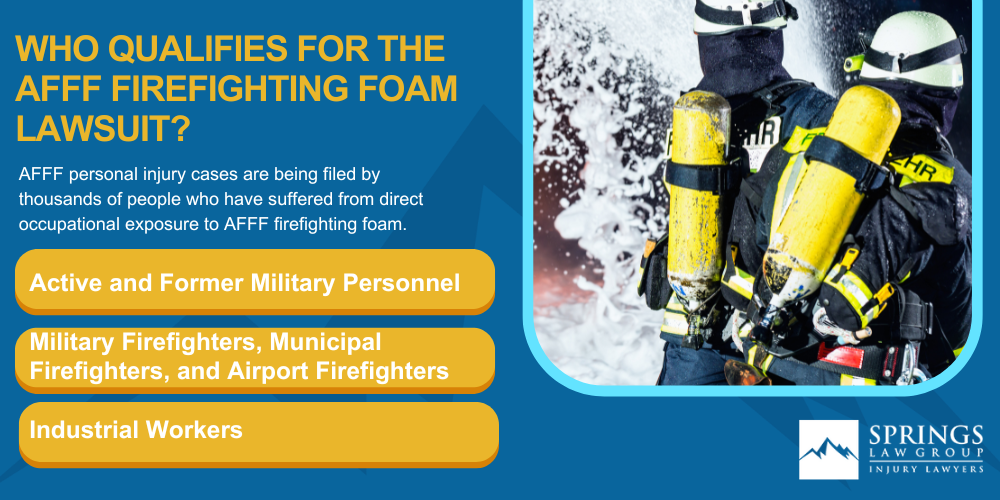
AFFF firefighting foam was used extensively across numerous branches of the U.S. military, including the Navy, Air Force, Marine Corps, Coast Guard, and Army.
Military personnel who worked in fire suppression, crash rescue, or hazardous material response were regularly exposed to AFFF, often without being informed of the risks associated with PFAS chemicals.
AFFF was critical for extinguishing fuel-based fires on military bases and was used during both training exercises and actual fire emergencies.
Over time, this foam contaminated soil, water sources, and even air on military installations, leading to significant exposure risks for active and former military personnel.
Those exposed to AFFF while performing duties such as aircraft rescue or equipment maintenance may now face serious health risks, including kidney cancer, bladder cancer, and other life-threatening conditions.
Individuals diagnosed with these health issues may qualify to file AFFF Lawsuits.
Common military settings and situations in which AFFF was used include:
AFFF firefighting foam was widely used by military firefighters, municipal firefighters, and airport firefighters to suppress fuel-based fires in various high-risk environments.
These firefighters were regularly exposed to PFAS chemicals in AFFF, increasing their risk of developing serious health issues like kidney cancer, testicular cancer, and thyroid disease.
The passage of the Firefighter Cancer Registry Act in 2018 created a national database to track cancer diagnoses among firefighters, highlighting the increased cancer risks within this profession due to toxic exposures, including those from AFFF.
Additionally, firefighters exposed to PFAS through their protective gear are also included in the AFFF MDL, as many firefighter turnout suits are treated with PFAS to make them more resistant to heat and water.
Studies have shown that these chemicals can leach from the gear, contributing to long-term exposure.
Firefighters who have suffered health problems from both AFFF foam and PFAS-containing gear are pursuing compensation through the AFFF Lawsuits, seeking justice for the severe impact these chemicals have had on their health and lives.
Settings where firefighters were exposed to AFFF:
Industrial workers who were involved in manufacturing, using, or disposing of AFFF firefighting foam products also faced significant exposure to PFAS chemicals.
These workers include those in industries such as chemical plants, oil refineries, and hazardous materials handling, where AFFF was regularly employed to extinguish fires involving flammable liquids.
Exposure in these settings often occurred through skin contact, inhalation of aerosolized foam particles, and the improper storage or disposal of AFFF products.
Long-term exposure to PFAS in the workplace can lead to severe health conditions, including kidney cancer, bladder cancer, and liver damage.
Workers in industries that utilized AFFF as part of their operations, as well as those involved in its manufacturing and cleanup, may be eligible to join the ongoing AFFF Lawsuits to seek compensation for their medical expenses and other damages.
Professions at risk of direct AFFF exposure include:
The dangers of AFFF firefighting foam are profound, as PFAS chemicals found in the foam have been linked to severe health conditions, including various cancers.
PFAS manufacturers failed to warn users about the potential long-term health consequences, putting countless individuals at risk.
The impact of these illnesses on individuals and their families is devastating, often resulting in prolonged medical treatments, financial hardships, and emotional stress.
Those affected are seeking justice and compensation for the significant toll these health issues have taken on their lives.
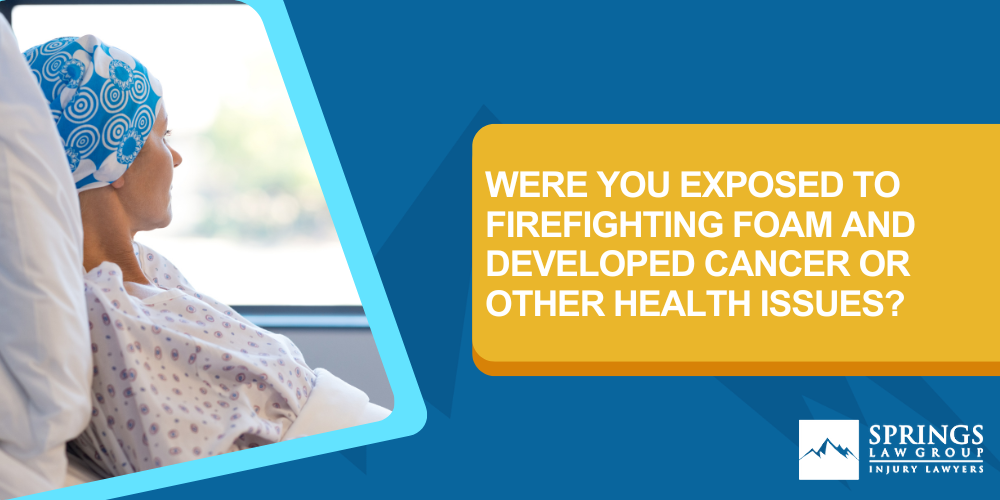
If you or a loved one were exposed to AFFF firefighting foam and subsequently developed cancer or other serious health problems, you may be eligible to file an AFFF Firefighter Foam Lawsuit.
Reach out to Springs Law Group today for a free consultation.
Use the chat function on this page to get an instant case evaluation to find out if you’re eligible to file an AFFF Lawsuit right now.
Lawyers can help plaintiffs through the process of an AFFF Foam Lawsuit, helping establish the link between health problems and their links to toxic firefighting foams.
AFFF Lawyers aim to make this process as seamless as possible for clients, knowing that they are going through or have gone through difficult medical treatments, financial burdens, and emotional stress caused by their health conditions.
Firefighting Foam Attorneys understand the profound impact that AFFF exposure has had on their clients’ lives and work diligently to secure compensation for medical costs, lost wages, and pain and suffering.
Their goal is to alleviate the legal pressures so clients can focus on their health and recovery.
Our experienced firefighting foam lawyers can help you understand your legal rights and options.
We are currently accepting new AFFF personal injury claims from active and former military service members, military firefighters, and others who were exposed to AFFF firefighting foam and subsequently developed cancer or other related health issues.

You can use the chatbot on this page to find out instantly if you are eligible to file an AFFF Lawsuit and seek financial compensation.
Our law firm is also available to conduct free, no-obligation consultations to assess eligibility for the AFFF Firefighting Foam Cancer Lawsuits.
The AFFF Lawsuit refers to the legal claims being filed against manufacturers of Aqueous Film-Forming Foam (AFFF), a firefighting foam containing toxic PFAS chemicals.
These chemicals, commonly called “forever chemicals,” are linked to serious health problems, including kidney cancer, testicular cancer, and thyroid disease.
Plaintiffs, including firefighters, military personnel, and industrial workers, allege that manufacturers knew about the risks associated with PFAS exposure but failed to provide adequate warnings.
AFFF Firefighting Foam Lawsuits have been consolidated into a multidistrict litigation (MDL) in the U.S. District Court for the District of South Carolina to streamline the pre-trial process for thousands of cases.
Individuals who have been diagnosed with health problems after exposure to AFFF may be eligible to join the lawsuit to seek compensation for medical expenses and other damages.
Individuals who have been diagnosed with serious health conditions, such as cancer, after direct occupational exposure to AFFF firefighting foam, may qualify to file an AFFF Lawsuit.
This includes firefighters, military personnel, airport workers, and industrial workers who used AFFF in their jobs or were exposed to PFAS chemicals through firefighting gear.
To qualify, plaintiffs generally need to show a connection between their exposure to AFFF and the development of their illness.
Those who believe their health issues are linked to PFAS exposure should consult with an experienced AFFF Lawyer to evaluate their claim.
Springs Law Group offers free consultations to any person who believes they may qualify for the AFFF Lawsuit.
Contact us or use the chatbot on this page to find out if you’re eligible to file an AFFF Lawsuit.
Exposure to AFFF firefighting foam has been linked to a range of serious health conditions, primarily due to the PFAS chemicals it contains.
The most well-documented health risks include kidney cancer, testicular cancer, bladder cancer, and thyroid cancer.
However, AFFF exposure has also been associated with liver damage, immune system suppression, and reproductive issues.
PFAS compounds accumulate in the body over time, which means the long-term effects of exposure can be devastating for those who have worked with AFFF regularly.
Use the chatbot on this page to find out if you qualify for the AFFF Lawsuit based on the health conditions you have suffered as a result of exposure to AFFF.
Plaintiffs in the AFFF Lawsuit may be able to seek compensation for a variety of damages related to their exposure to AFFF firefighting foam.
This includes compensation for medical expenses, such as treatment costs, surgeries, and ongoing care related to cancers or other serious health conditions.
Plaintiffs can also seek compensation for lost wages if their illness has affected their ability to work.
Additionally, compensation for pain and suffering — including the emotional and psychological toll of living with a serious illness — may also be available.
It is essential to connect with experienced firefighting foam lawyers to understand what compensation may be possible in your AFFF Lawsuit.
Contact Springs Law Group today to learn more and connect with our AFFF Lawyers.
AFFF Lawsuits have been consolidated into MDL 2873 in the U.S. District Court for the District of South Carolina.
This multidistrict litigation structure allows for the efficient handling of thousands of cases that share common facts, such as the use of AFFF and the resulting PFAS exposure.
Currently, bellwether trials are scheduled to begin, which will serve as test cases to help guide the resolution of future lawsuits.
No final personal injury settlements have been reached yet, but settlements in other municipal water contamination claims have set a precedent for significant compensation.
The outcome of bellwether trials will be critical in shaping future settlements and the direction of the AFFF Lawsuits.

Partner
Attorney, Christopher M. Nicolaysen focuses primarily on helping those injured in car accidents due to no fault of their own.
The personal injury matters include auto accidents, bicycle accidents, pedestrian accidents, and trucking accidents.
Chris truly enjoys helping clients through a difficult time and helping them get the compensation they deserve.
We use reviews to help show more people like you why we do what we do!

I was uneasy about reaching out to a law firm after being in an accident that left me injured and my vehicle totaled. I don’t care for the idea of suing for what was very clearly an accident. However, after learning more about the overall process of working with a professional team to navigate the murky waters of the insurance world, I was pleasantly surprised to find that the experience wasn’t as gross as I’d originally felt about it.

Springs Law is very friendly and professional. I always felt that they were on my side and cared about my injury and what I was going through. I highly recommend them.

Springs Law Group is an amazing group to work with! I got into a rough accident, and they never ceased to let me know they were there working hard to help me in my hour of need. It was always very easy to reach out to someone if I had any questions, and they were always happy to answer any questions I had.

I never have a problem with getting a response when I need them – which is not the case with most other firms. They really truly care about each client. As a plus, they always have positive attitudes, which matters tremendously when you are in a stressful legal situation.

Big thanks to Mr. Jake Kimbell and his team for their assistance with my case. He helped me through an incredibly challenging part of my life, and most importantly helped navigate through the convoluted legal channels of my case. I cannot thank him and his team enough for their support.

The entire team at Springs Law group has been nothing but amazing. Jake and the rest of the staff were great to work with and extremely professional. They were very attentive and answered any questions and concerns I had. I was always able to contact them and they were very responsive and communicated with me.

Springs Law Group is an amazing group to work with! I got into a rough accident, and they never ceased to let me know they were there working hard to help me in my hour of need. It was always very easy to reach out to someone if I had any questions, and they were always happy to answer any questions I had.



